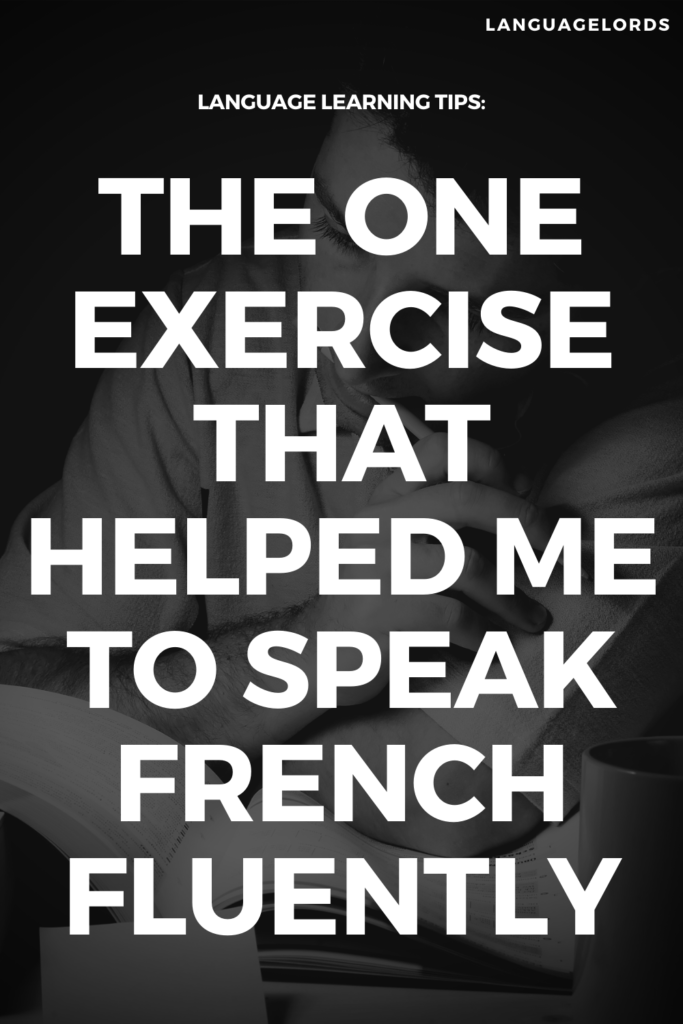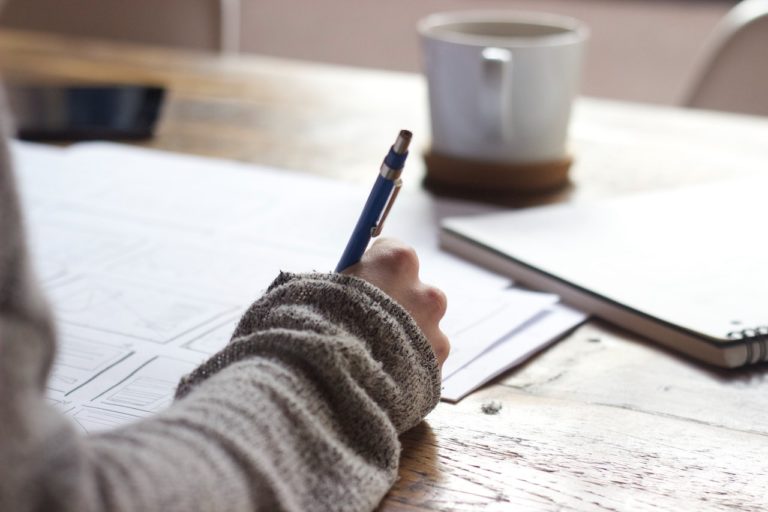
Greeting LANGUAGE LVRDS.
Have you ever said to yourself; “I want to speak french fluently”,” how long does it take to speak french fluently?”, or “what is the best way to learn french fast?”.
If these questions have been on your mind then you’ve come to the right place.
If you would like to follow along you can watch the video below:
Why I Want To Learn How To Speak French
Several years ago I have always wanted to speak another language and french was my first language of choice, especially since I was interested in fashion.
I studied for many hours with the famous language program rosetta stone and finished it.
But one thing I quickly realized when I was done was…
I was not able to speak any french.
All these problems and questions led me to this following experiment.
All my doubts made me question “will I ever learn to speak french?”.
Therefore, if you’re interested in how you too can learn how to speak french fluently, then continue reading.
The Best Way To Learn To Speak French Fluently Fast
Today I’m gonna show you the one exercise that replaced nearly everything else I was doing to learn French.
It is 99% responsible for me finally being able to speak French fluently.
This is a variation of the exercise I used in the following video:
How I Got Fluent In French in 30 Days.
In that video I did an experiment with an exercise which brought me great results and helped me understand how to get fluent in a language.
The reason why I like this exercise is because it develops fluency no matter what level you’re starting at.
It’s the main exercise I do to improve my French, but even if you’re a beginner you can start doing this today.
As long as you know how to form sentences in your target language, and they don’t even have to be perfect.
What you need to get started speaking french fluently
All you need is your computer and 2 free apps called:
If you have a mac you can download DeepL for your desktop, if not, just use the app on their site.
So now that have you have all your tools are you ready to discover how to become fluent in french?
How To Speak French Fluently Fast In 6 Easy Steps
Step 1: Find a story to tell
The first thing you’re going to do is get on your computer.
Open up whatever program that can record video and press RECORD.
Now you’re going to tell a story in your target language and record yourself speaking for 5 minutes.
It has to be a story about you, and a story that you’re comfortable telling to others.
And most importantly it has to be a story that you know VERY well.
In fact, if you need to take 5 minutes to tell the story in your native language before you start recording to get the details straight…
By all means do it!
A good example of a story is how you met your best friend or how you ended up in the current job that you have.
Try to tell a story that you enjoy…
So maybe not the job thing : ).
If you finish your story before the 5 minutes are up, start over and tell it until the 5 minutes are finished.
And if you don’t finish the story in 5 minutes, keep going until you’ve told the entire story.
When you don’t know how to say a certain word in the story in your target language, say it in your native language.
If you don’t know how to structure a certain sentence, give it your best shot in your target language and then say it in your native language.
Now during these 5 minutes you’re likely to experience some discomfort.
The first time you do this, it should be difficult if you’re a beginner, it should be fairly easy if you’re advanced.
Just push through and it will pay off.
The pain you feel while doing this is the reason why people don’t do speaking exercises.
And people who don’t do speaking exercises is the reason why people don’t make any speaking progress.
Ok, YOU GET IT! : D
Step 2: Write Down Your Problem Areas
After the 5 minutes are up, stop the recording and watch the video.
Look out for 2 things while you watch yourself speak and write them down.
These are:
- Words that you didn’t know how to say
- Sentences that you didn’t know how to structure.
Take the list of words you didn’t know, translate them in DeepL and create an Anki Deck for them.
Give the story that you told a title and name this Anki Deck the same thing.
This deck is only for words that you use in telling this story.
Don’t put any other words in this Anki Deck!
Every story that you tell will have its own Anki deck.
Take the list of sentences you didn’t know how to structure, translate them in DeepL, but put them in a Google Sheet.
Step 3: Repeat Your Story
Now, open up your video player again, press record and repeat what you did earlier.
Tell the same story for another 5 minutes.
You should see that it’s a bit easier to do now that you’ve looked up the words and sentence structures you didn’t know before.
But telling the story will still likely be difficult at this point.
If so, that’s fine, just keep going.
After this second session is done, watch the video.
You’ll notice that you probably didn’t tell the story with the exact same words and sentences as you did the first time, which is a good thing.
So write down any NEW words that you used and did not know how to say and any NEW sentences that you didn’t know how to structure.
Add the new words to the same Anki Deck you created earlier.
Then add the new sentences to the Google Sheet.
Step 4: Add New Words To Your Anki Deck
Finally, open your video player and repeat this process a third time.
Put any new words in your Anki Deck, and any new sentences in your Google Sheet.
You’ll notice by the third time doing this that you’ve already become a lot more proficient in telling this story.
Now, Do the same exercise with the same story for a week straight.
And then the second week that you do this, start a new story, and the next week, a third story and so on.
As you get better at the exercise, you won’t need an entire week for each story.
After telling the story becomes automatic, move on to the next story.
Work up to the point where it only takes 2 days to finish the exercise and move to the next story.
Developing a french vocabulary for fluency
What’s going to happen is you’re going to develop a vocabulary of your life.
A vocabulary of words related to your interests, your family and friends, your job, etc.
The more diverse your stories are, the better because you’re gonna be exposed to different words.
But it’s all going to be in the context of stories that are relevant to your life.
As you continue, you’ll start being able to use these words in different contexts outside of these stories and in regular conversations when you talk to other people.
Cool right?
And that’s the beginning of fluency – using the words you know in new contexts without having to think about it.
How many words does it take to be fluent in french?
Many of us think that reaching fluency means you have to learn a hundred thousand words and that’s not true.
Fluency is actually just how well you use the words that you know in different contexts.
That only comes through practice using the words you use most often in your everyday life…
Which is what you get from this exercise.
Step 5: Review Your Vocabulary List
Ok, now we’re going to use Anki to really internalize the new words you learn.
Go over the Anki deck that you created for this story at least twice a day.
I recommend once right before you start this storytelling exercise, and once either before bed or as soon as you wake up.
Do the same with the sentences you put on the Google Sheet.
Just read over them, and don’t really stress it.
And this will make telling the story much easier the next time by helping you recall the words you need, faster.
And you’re going to notice that after just 3 or 4 days of telling this story you’re going to be able to tell it almost automatically.
You’re going to experience what it feels like to speak fluently without really having to think about what you want to say.
Step 6: Get a Language Partner
Finally, take it a step further and get a language partner.
Write out your entire story beforehand, send it to your language partner during your session and let them correct it with you.
Let them tell you why they would change certain things.
This will help you understand more about the language structure so you can improve your grammar and find more natural ways to say things.
A great place to find language partners are on HelloTalk which you can download on the app store.
Many people on this app are looking for language exchange partners and are willing to lend a helping hand.
Final Thoughts: How Long Does It Take To Speak French Fluently ?
When it comes to knowing how long it takes to speak fluently there are a few things that we have to define.
I think the first thing is the definition of fluency.
As stated before I like to define fluency as “how well you use the words you know”.
So if you only knew only 200 words in your target language how effectively can you use and speak with those words quickly.
Meaning it doesn’t take much time to process and speak with them.
Then the second thing is how many words does it really take to have a good base.
In a past post we mentioned it takes around 2,500 words to understand 80% of a spoken language.
However, we are talking about fluency and I truly believe that with only we can speak fluently with less then that.
Again how well you know the words and speak without much effort shows your fluency.
Therefore, the more time you spend speaking and internalize the words you speak with you can see the results of fluency within just 30 Days as I did in the video above.
So there you have it.
My one exercise that helped me speak french fluently.
It was one of the best exercises I have done and will continue to do in my studies.
I definitely recommend it to anyone who wants to learn to speak a language.
If you don’t feel like you’re ready to get started with this exercise yet and still are trying to figure out where to get started then be sure to check out our post how to learn a foreign language.
Here are some other posts you may like:
